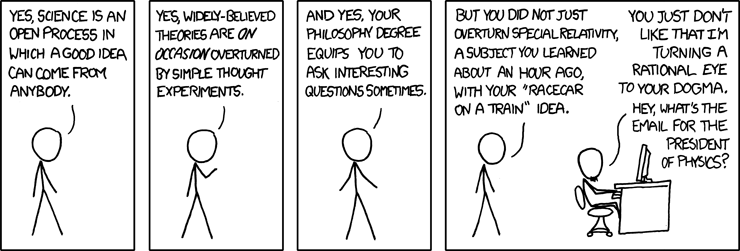McCulloch wrote:And if you are arguing a position that has the support of no current expert in the relevant fields, from where I sit, you are not going to leave the starting blocks.
There exists experts that support my view. However, they would of course not be in the mainstream.
Grumpy wrote:And you will note that I do not debate religious ideas other than when they are put forward as real science(which they are not), such as claiming flood myths reflect real events.
Well, we shall meet often then.
The point is that citing authorities is not always an appeal to authority. When one is referencing the science developed by a scientist in the field of his expertise and citing his research, it is not a fallacy and claiming it is is a dodge by the losing debater.
I never said citing an authority is an appeal to authority. What I am saying is that simply saying that a bunch of experts believes something makes it true is not a logical argument. What is required is going into the evidence and arguments that the experts present.
And it was relevant to this discussion due to you denying having brought the subject up. And around and around we go.
I'm not sure what you are saying here.
Scotracer wrote:otseng wrote:Scotracer wrote:
An argument from authority is a form of informal fallacy.
Not sure what you mean by this. But appeals to authority, no matter the form, would be fallacious.
Yes it is fallacious, but it's not a
formal fallacy.
That's all I'm saying, that it would be fallacious. And it would not carry any weight in debates. Are you saying informal fallacies should be admissable as logical arguments in debates?
Nilloc James wrote:However I have a feeling that by "religous experts" you mean experts like preists etc. Though knowlagable they are biased to the point where I have to take everything they say with a grain of salt.
Everyone has biases, including scientists.
Scotracer wrote:Religion does not rely on evidence (and therefore understanding of said evidence), it relies on claims that are immaterial and therefore can only be approached using logic and philosophy.
Logic and philosophy are definitely are found in religion. But, empirical evidence can also be found in religions. Some more than in others.
But on the front of things like what is moral, and what is rational, I feel even the layman can contribute.
I believe that
any layman can contribute as long as evidence and logical arguments can be presented.
thatoneguy wrote:
(1) that when the experts are agreed, the opposite opinion cannot be held to be certain; (2) that when they are not agreed, no opinion can be regarded as certain by a non-expert; and (3) that when they all hold that no sufficient grounds for a positive argument exist, the ordinary man would do well to suspend his judgement.
it emphasizes the ridiculousness of so many people that believe they know better than the experts.
In point (1), I assume it means that 100% of experts are agreed. However, this is hard to achieve for almost all theories.
Experts can be wrong, but even if you're going to disagree with them without being an expert, it would still be ridiculous to be completely sure that you are right.
I certainly can be wrong. But, what should the proper approach be to show that I'm wrong? Wouldn't it by offering evidence and logical arguments, rather than by simply stating that it's not what the majority of experts believe?
As for the Argument from authority thing, it is fallacious to only reference the conclusion reached by someone more knowledgeable (like Einstein's belief that randomness did not lie at the heart of nature) is fallacious. If you cite their reasons, or explain them yourself, then it is not.
I completely agree!
The idea that a holy book gives you more knowledge about scientific subjects than people who have spend nearly their entire life doing research on it is just silly.
Who said anything about a holy book or even quoted from it?




